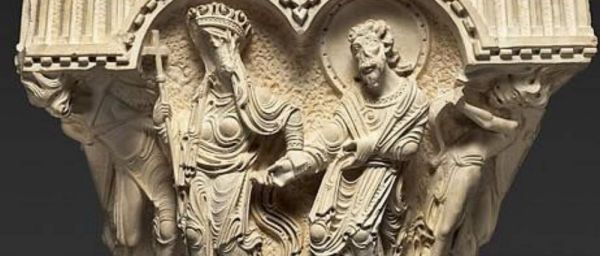(Mt 13:31-35)
Jesus helps people discover the things of God and of man in everyday life.
The Master teaches that the extraordinary nature of the eternal world is hidden in ordinary things: life itself is a transparency of the Mystery.
He reveals the Kingdom that is becoming Present, describing the essential characteristics of the community of disciples - and using here the simple comparisons of the 'mustard seed' and 'yeast'.
In other words, the authentic Church is within everyone's reach, everywhere - yet small, inconspicuous, and yet intimately dynamic.
In it, we experience a contrast between beginning and end: we experience the Kingdom 'within' each one who welcomes the character of a humble Word-event, but which activates transformative and hospitable capacities.
The first point of comparison linked to people's lives [the seed] refers to the story of a very small grain of wheat: a concrete, common story that is not particularly noticeable.
Around the Sea of Galilee, mustard bushes can reach a maximum height of 3 metres, no more.
This is not the growth of majestic cedars of Lebanon, but rather a small tree in a home garden (v. 32), yet capable of providing a little refreshment to the birds that take refuge there.
It indicates a presence that is not very noticeable: completely normal, mixed in with aubergines, courgettes and cucumbers...
Nothing great, yet hospitable to those who suffer the intense heat of those places.
In short, the brotherhoods that the Lord dreams of will have nothing magnificent or outwardly impressive, but they will be able to offer shelter and rest.
The strength of the 'mustard seed' is intimate, yet stubborn: it will grow - even if not by much.
In other words, the authentic Church should not resemble a majestic ocean liner.
Perhaps it will be more like a small boat: nothing special, yet capable of inspiring hope for life.
It will do so through the discreet witness of loving evangelisers who continue to proclaim and work, radiating light and captivating people.
Anyone who approaches the threshold of churches – I am referring to those who are distant and pagan – must feel at ease, at home.
Even the 'wanderers' will have every right to take up residence and build their nest [in this common dwelling] even if they decide to fly away again as soon as they have served their purpose.
The next comparison - that of 'yeast' (v. 33) - emphasises the importance of caring for the life goals of other brothers and sisters in the community of believers.
In this way, it is called to be a sign of the Father's care for all his children.
Yeast is not useful to itself, but to the dough.
In the same way, the Church must not serve itself; it will not be concerned with its own celebration or development (material, proselytism, etc.).
Every Fraternity in Christ is a function of the life of the people, wherever and however they find themselves - just as they are.
To internalise and live the message:
What seed did you neglect because of its smallness, and then it proved essential for your growth and the needs of others?
[Parables: Narrative for transmutation]
The mystery of common blindness. Lost? Ready for transformation
(Mt 13:34-35)
St Paul expresses the meaning of the 'mystery of blindness' that contrasts with his journey with the famous expression 'thorn in the side': wherever he went, enemies were already waiting for him, and unexpected disagreements arose.
So it is for us: disastrous events, catastrophes, emergencies, the disintegration of old reassuring certainties - all external and murky; until recently considered permanent.
Perhaps in the course of our existence, we have already realised that misunderstandings have been the best way to reactivate ourselves and introduce the energies of renewed life.
These are resources or situations that we might never have imagined as allies in our own and others' fulfilment.
Erich Fromm says:
'To live is to be born every moment. Death occurs when we cease to be born. Birth is therefore not an act; it is an uninterrupted process. The purpose of life is to be born fully, but the tragedy is that most of us die before we are truly born'.
Indeed, in a climate of unrest or absurd differences [which force us to regenerate], the most neglected inner virtues sometimes come to the fore.
New energies - seeking space - and external powers. Both malleable; unusual, unimaginable, unorthodox.
But they find solutions, the real way out of our problems; the path to a future that is not simply a reorganisation of the previous situation, or of how we imagined 'we should have been and done'.
With one cycle concluded, we begin a new phase; perhaps with greater rectitude and frankness - brighter and more natural, humanising, closer to the 'divine'.
Authentic and engaging contact with our deepest states of being is generated in an acute way precisely by detachments.They lead us to a dynamic dialogue with the eternal reserves of transmuting forces that inhabit us and belong to us.
A primordial experience that goes straight to the heart.
Within us, this path 'fishes' for the creative, fluctuating, unprecedented option.
In this way, the Lord transmits and opens his proposal using 'images'.
An arrow of Mystery that goes beyond the fragments of consciousness, culture, procedures, and what is common.
For a knowledge of oneself and of the world that goes beyond that of history and current events; for an active awareness of other contents.
Until the turmoil and chaos themselves guide the soul and compel it to a new beginning, to a different perspective (completely shifted), to a new understanding of ourselves and the world.
Well, the transformation of the universe cannot be the result of cerebral or dirigiste teaching; rather, it is the result of a narrative exploration that does not distance people from themselves.
And Jesus knows this.












